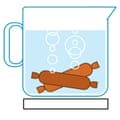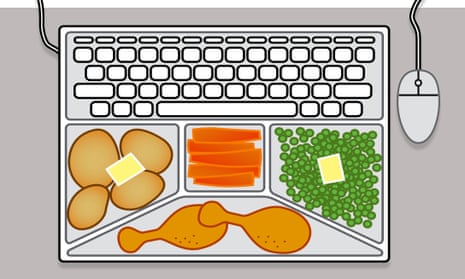As winter finally begins to bite, the idea of the al-desko lunch seems increasingly alluring. No one wants to take their sandwich to the park when it’s snowing, and even the walk to the local cafe can seem too much when it is through wind and rain.
But is there a right and a wrong way to eat at your desk? Should we be even doing it in the first place? We asked some experts and office workers.
Is it OK to eat al desko?
Absolutely not, says Henry Stewart, founder and “chief happiness officer” of the workplace consultancy Happy. “It’s madness. We’ve got to get people out of the hamster wheel of continual work. It’s not good for them and it’s not good for the organisation. All the research shows that people work more effectively if they take breaks.”
Stewart banned al-desko dining at Happy several years ago, not for any lofty motive but because someone – it may even have been him – spilled hot chocolate on the carpet the day they moved in. Now his team all have lunch – and afternoon ice-cream breaks – together at the cafe next door. “I thought it would last about a week,” he says, “but it’s still going and it has [had a] hugely beneficial effect. You talk to people you might not normally talk to. It increases communication and generally improves the effectiveness of an organisation.”
It’s a smart career move, adds André Spicer, professor of organisational behaviour at the Cass Business School in London. “It’s good for job satisfaction, performance, promotion … Why? Because eating is a social ritual in which people swap information.”

And it’s enjoyable, says PR William Matthews. “Breaking bread with your colleagues every day is far better for team spirit than the dreaded once-in-a-blue-moon ‘organised fun’ that so many companies go in for. People are social beings and eating together is a sort of primeval thing.” He has fond memories of the boss who made everyone down tools for a “proper seated lunch with proper crockery and cutlery, so everyone could clear their heads and enjoy the food”.
So, everyone agrees that eating al desko is a bad thing? Hardly. “It’s absolutely OK to eat a snack at your desk,” says Myka Meier, founder of Beaumont Etiquette. “You simply want to be cautious of eating smelly food. Etiquette is all about being kind, respectful and considerate of others.”
Bruce Daisley, European vice-president at Twitter and author of The Joy of Work, has a warning for anyone tempted by a ban. “For me, this is a bit like organisations that ban you from accessing email outside work hours. The intentions are good but nannying people never has the outcome that you want. You’re turning people into infants, taking away their right to self-determination.
“If people sit down to lunch together,” he adds, “they do tend to collaborate better – unless you force them to do it, in which case all that benefit tends to go. You’ve just got to let people do what they want. If you have no agency, you feel unhappy, you feel demotivated, you feel estranged from your job.”

And let’s not forget that scarfing down a sandwich at your desk leaves you free to spend the rest of your break exactly as you want. A run or a visit to the gym may not give you an opportunity to bond with your colleagues, but a) not all colleagues are worth bonding with, and b) it will do wonders for your physical and mental health.
All right, then. Is it OK to use the words ‘al desko’?
Again, it depends who you talk to. It’s an “abomination”, says author Helen Jones. Etiquette expert Meier, however, thinks it “adds humour to a rather dull form of dining and makes people think of dining at their desks in a way that requires thoughtfulness”. So she’s all for it.
What about boozing in the office?
“Unacceptable,” says Stewart. “That’s another clear rule – you don’t drink within office hours.”
Spicer is less dogmatic. “In most normal offices there’s a sense of when you’re able to drink and when you’re not. In my workplace, after about 4pm on Friday it’s maybe OK to have a glass or two.

“In recent years,” he notes, “there’s been a kind of blurring between workspace and non-workspace, and many organisations are beginning to design their workplaces to look like bars. Some shared workplaces provide an unlimited supply of beer as well as tea and coffee.”
“I think drinking’s fine, within reason,” says Daisley. “Opening a bottle of red at your desk? Probably not OK. But there’s good evidence that a bit of moderate drinking can increase people’s affinity for one another.” Normally that’s reserved for the pub, he says, but a lot of workers don’t like them, or don’t have time to go drinking after work.
Tea and coffee?
A rare area of consensus: everyone agrees it’s OK to have these at your desk. But should you make your own or have some sort of round?
“I think it’s a very important idea,” says Spicer. “It’s a lot like buying a round in the pub but without the alcohol. It ties the group together into a kind of formal ritual. It might seem like a pain in the butt when you have to constantly get people coffee or tea, but it binds people together and gives them a reason to speak to each other.”
Or, occasionally, to shirk a few minutes’ work. “I’m against them,” says journalist Sophia Furber. “I used to have them in a previous job and whenever I got to my editor to ask if she wanted a cuppa she would snipe: ‘I’d rather you brought in some news.’” That’s not the only potential conflict: everyone who has been part of a tea or coffee round will be familiar with the colleagues who are much happier drinking than making. “There are definitely givers and takers,” is how Daisley puts it.
Still, there are worse abuses of the facilities. “I once worked with a guy who made hot dogs in the coffee maker,” recalls development scientist Sarah Callens.
Is there any food you should avoid?
Anything too smelly, for a start. “There used to be someone at my work who cooked fish at lunchtime,” Daisley says. “It’s just not a considerate thing to do, is it? I don’t want the office to smell of kippers. I think it’s just about respect for others.”
“Never fish,” agrees City worker Rosie Johnson.
As well as “microwaved cephalopod leftovers” and “collective fish and chips in a small shared space”, Callens objects to: “Chilli con carne al desko, sandwich platters that pong and curl in the centre of the table for two hours after everyone has eaten, chicken that smells like the bus …”
Even nice smells can be a problem, Daisley warns. “Are you creating desires and urges in people that they would like to be free of?”
But it’s not just odours you have to worry about. Callens has an aversion to “crisp bag rustling”, while HR manager Nicky Maine hates “people who eat apples. I cannot abide that tearing and wrenching sound, followed by munching. In fact, I detest the very word ‘munching’.”

“I love the fact that we’re going to ban apples,” says Daisley. “What, we’re just going soft fruit only? Pears are OK because they’re a touch more giving …” Still, this leaves plenty on the menu.
Or does it? Respondent after respondent complained about workmates who hog the microwave by cooking jacket potatoes from scratch, or fail to free it for the next user the moment the timer goes ping. And if you don’t offend your colleagues’ noses, ears or sense of urgency, you still have to contend with their aesthetic judgments. “I have a colleague who puts cheddar cheese on sweet things: hot cross buns, Christmas cake, malt loaf etc,” says teacher Johanna Johnston. “It’s the not-rightness that bothers me! None of these items need adornment.” Rosie Johnson, meanwhile, even objects to white bread sarnies, on the ground that white bread “is not the bread of self-care”.
It’s enough to give you indigestion.

Comments (…)
Sign in or create your Guardian account to join the discussion